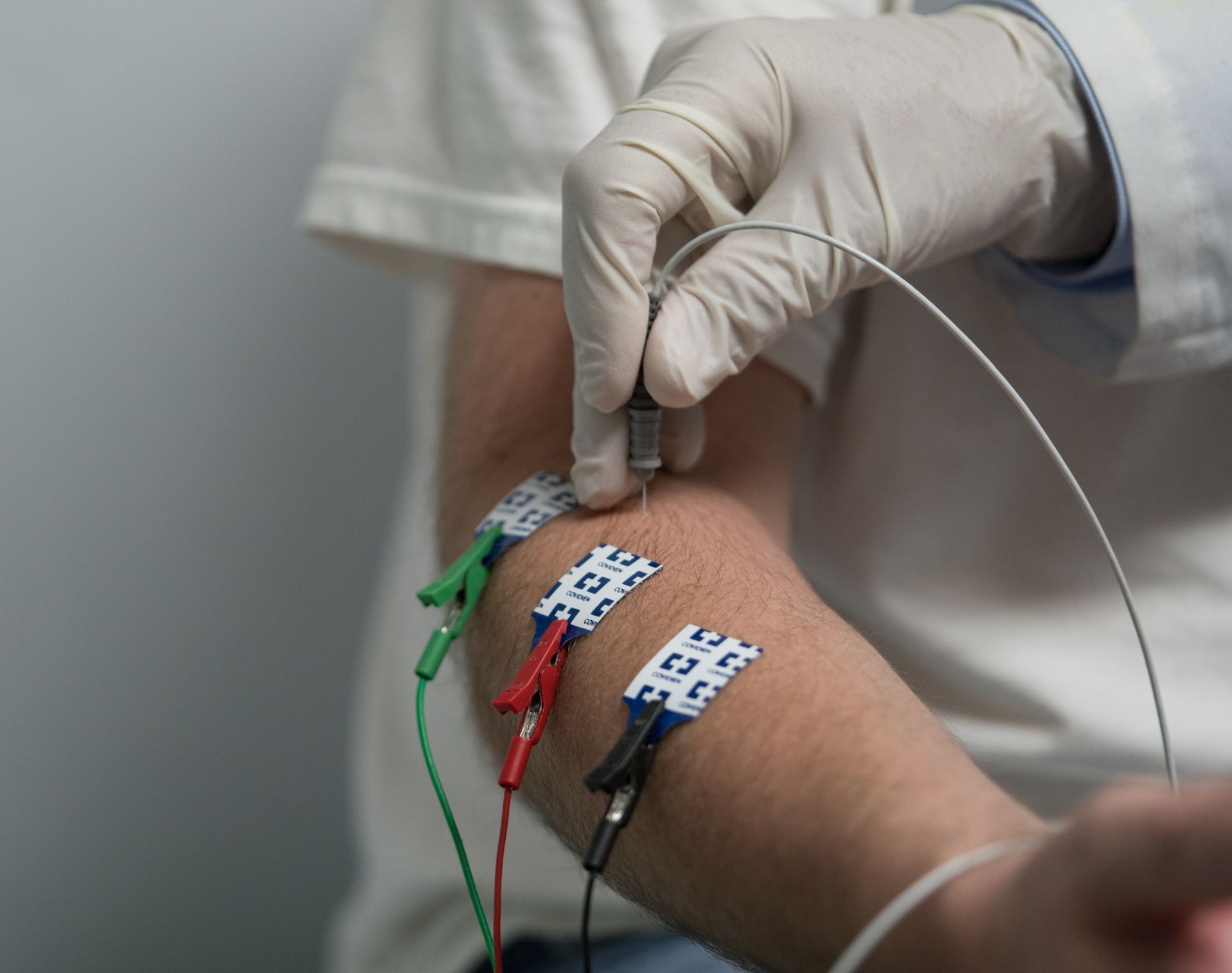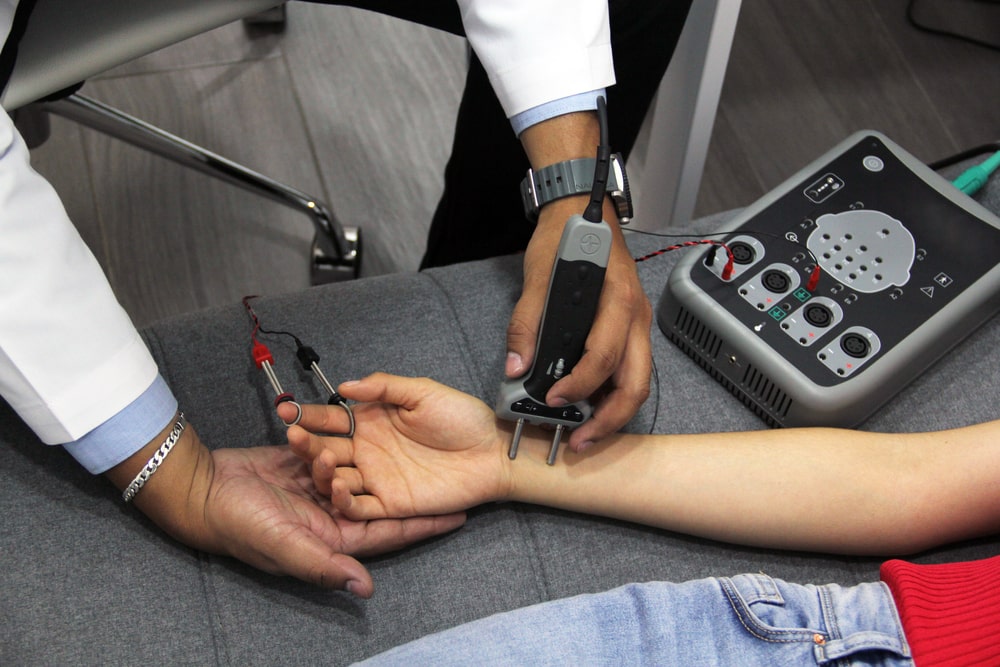This service or treatment is generally covered by most health insurance policies. You are responsible for checking your insurance policy cover, and you may need a referral letter. Check which insurance companies are covered.
Private Nerve Conduction Studies / EMG Test
These investigations are used in the diagnosis of muscle and nerve disorders and conditions such as carpal tunnel syndrome and peripheral neuropathy.

What are nerve conduction studies and EMG?
A nerve conduction study involves testing relevant nerves and muscles to measure the speed at which electrical impulses travel along your nerve. EMG (electromyography) uses a small needle to record electrical activity from within one or several muscles. Together, these studies can indicate how well your muscles and the nerves that control them are working.

What can EMG and nerve conduction studies diagnose?
EMG and nerve conduction studies are used in the diagnosis of many muscle and nerve disorders. Nerve conduction studies help to identify and characterise nerve damage or disease. An EMG test is often performed to provide complimentary information to confirm if your muscles are responding to their nerve signals as expected. When performed together, these tests provide clarity as to whether symptoms are caused by a muscle or a nerve disorder, as well as localising and assessing the severity of a problem.
You may need these tests if you have symptoms of a muscle or nerve disorder, such as:
muscle weakness
tingling or numbness in your arms, legs, hands, feet and/or face
muscle cramps, spasms and/or twitching
muscle paralysis
Conditions that can be diagnosed based on the results of these tests include:
cubital tunnel syndrome and other nerve entrapments
peripheral neuropathy
nerve root entrapment (radiculopathy) e.g. related to a herniated disc
Guillain-Barré syndrome
myasthenia gravis
myopathy
muscular dystrophy
Charcot-Marie-Tooth disease (CMT)
amyotrophic lateral sclerosis (ALS), also known as Lou Gehrig's disease
benign / cramp-fasciculation syndrome

What happens during a private EMG Test?
Your tests will be carried out in our state-of-the-art facilities by one of our experienced Consultant Clinical Neurophysiologists. At an initial consultation or during the investigation, they may ask you some questions about the history of your symptoms as well as your medical history.
On the day of your tests, it’s helpful to wear loose-fitting clothes as this will reduce the need for undressing. Your consultant will typically need to get access up to your elbow, or up to your knee, so you may be asked to roll up any sleeves and remove your shoes and socks, tights or stockings. Occasionally, further EMG examination may include shoulder or hip muscles and a chaperone is always available if required.
Please avoid wearing any skin creams or oils as these interfere with the application of skin electrodes. If tests are being performed on your face, you may also be asked to remove make-up, as these can interfere with the investigation.
Nerve conduction studies:
To begin, your consultant will apply electrodes to the surface of your skin. They will then stimulate your nerves, usually in your arms or legs, with small electric pulses, and the responses are recorded. While the electrical stimulation can feel a little unpleasant, it should not cause too much discomfort, and any sensations last for only a few moments.
Electromyography (EMG):
Your consultant will insert a fine electrode needle into the muscle being investigated before asking you to move the muscle or relax it. The muscle activity is recorded by the needle. Following the investigation, your studies and recordings are analysed and a report with any conclusions will be sent to your referring consultant.
Are there any risks associated with EMG tests?
Nerve conduction studies are non-invasive, and there is no risk of side effects unless you have an implanted medical device. If you carry a pacemaker or a cardiac defibrillator, your consultant will take certain precautions. Even then, the risk is very small, and with proper precautions, the malfunction of these devices has not been reported. Needle EMG can be a little painful and may produce small bruises. Please inform the consultant if you are on a blood thinner (e.g. Warfarin or Rivaroxaban), although any risk is again very small.
Does an EMG hurt?
Although some patients find the studies a little uncomfortable, they should not cause too much pain. Any discomfort will generally disappear within minutes once we stop the procedure. If, however, you find any procedure too unpleasant, let your consultant know and they will do all they can to help you feel more comfortable.
How long do EMG test results take?
Depending on the problem you have, your consultant will decide on how many and which nerves or muscles need to be examined. Depending on the complexity of the issue, private EMG and nerve conduction studies may take anywhere from 15 to 45 minutes, with most tests being completed within half an hour.

Why Welbeck?
At Welbeck, our consultants are experts in the diagnosis and treatment of nerve and muscle disorders and conditions. All consultations and care take place within our state-of-the-art facilities, enabling our delivery of accurate diagnostics and advanced treatments. With access to colleagues across other specialities, our consultants are also able to refer within the Welbeck ecosystem to ensure you receive the best possible treatment as quickly as possible, all under one roof.
Book a private nerve conduction study or EMG test
To book a private nerve conduction study or EMG test, you must be referred by either your GP or a neurologist following a consultation with them. Self-referrals are not accepted for this test. If you already have your referral, please email it to bookings.neurology@onewelbeck.com, and a member of our clinical team will be in touch.
If you would like to schedule a consultation with a neurologist, please get in touch to make an appointment. Your health is important to us, so we strive to offer same-day appointments whenever possible.
Our consultants are recognised by the major health insurance companies. If you have private health insurance, your treatment at Welbeck can begin once you have obtained authorisation. We also provide care to self-paying patients. Learn more about the different payment options at Welbeck.
Paediatrics
We are able to offer appointments to referred paediatric patients aged 12-18. For full information on our paediatrics service, please visit our main Paediatrics page.



